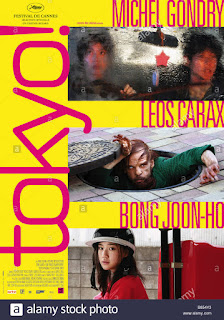Tokyo! (2008)
Directed by: Michel
Gondry (Interior Design) and Leos Carax (Merde) and Joon-ho Bong (Shaking
Tokyo).
Written by: Michel
Gondry based on the graphic novel by Gabrielle Bell (Interior Design) and Leos
Carax (Merde) and Joon-ho Bong (Shaking Tokyo).
Starring: Ayako Fujitani (Hiroko -
Interior Design), Ryo Kase (Akira - Interior Design), Ayumi Itô (Akemi - Interior
Design), Nao Ohmori (Hiroshi - Interior Design), Satoshi Tsumabuki (Takeshi - Interior
Design), Motomi Makiguchi (Clochard - Interior Design), Denis Lavant (Merde –
Merde), Jean-François Balmer (Maître Voland – Merde), Renji Ishibashi (L'avocat
général - Merde), Toshiyuki Kitami (Le procureur - Merde), Kyûsaku Shimada (Le
directeur de prison - Merde), Azusa Takehana (Le présentatrice TV - Merde), Yû
Aoi (La livreuse de pizza - Shaking Tokyo), Teruyuki Kagawa (L'homme - Shaking
Tokyo), Naoto Takenaka (Le patron de la pizzeria - Shaking Tokyo).
It is
somewhat odd that an omnibus movie called Tokyo, which features a trio of short
films set in and about the Japanese city, contain no films by a Japanese
filmmaker – opting instead for two Frenchman and a Korean director. And yet,
for the most part this strange decision works – as the trio of films are all
about the alienating effect the city can have – making everyone feel like an
outsider, like they don’t belong there. The filmmakers in question are Michel
Gondry, Leos Carax and Joon-ho Bong, and while none of the segments come close
to being among their best work, they are all interesting in their own way.
Gondry’s
segment is called Interior Design, and is about a young Japanese couple who are
struggling to find an apartment in the expensive, overcrowded city, and have
been crashing at a friend’s place. Akira (Ryo Kase) is an aspiring filmmaker
(which gives Gondry a chance to do what he apparently loves most – make a
parody of low budget art films in all their pretentious glory). His girlfriend
Hiroko (Ayako Fujitani) is supportive of his career and ambitions, and they
seem happy enough. But the apartment search drags on – and she begins to feel
more and more useless and aimless, realizing that she doesn’t have many
ambitions of her own. Eventually this emotional toll turns physical – and she
literally starts changing in a way that allows Gondry many chances to be funny
and whimsical, in a story that may have been better served with a more serious
touch.
Carax’s
segment entitled Merde is about the title character (played by Denis Lavant, in
a great performance, that is kind of a dry run for part of the pairs brilliant
collaboration Holy Motors a few years later). Merde is a milky eyed monster,
emerging from the sewers of Tokyo to terrify residents. In the single best
scene in the entire movie, he emerges and take a long walk down the crowded
street (all in one unbroken shot) as he terrorizes everyone – stealing
cigarettes, sandwiches, popping balloons, hitting babies, etc. Eventually,
he’ll go even farther that that – and will be captured, and out on trial. He
doesn’t speak a language anyone can understand – other than a bizarre French
lawyer (Jean-François Balmer), who looks like a not too-distant relative. An
extended courtroom scene follows – and drags the film to a halt, although you
have to admire the persistence of putting it on the screen.
The
overall best sequence is by Joon-ho Bong entitled Shaking Tokyo. It stars
Teruyuki Kagawa as a hikikomori – that he is explains is someone who has
retreated from society, and never ventures from their home anymore. He survives
on money from his dad, and lives a regimented life – and has for 10 years – on
routine, and no human contact. That is, until he makes eye contact with the
pizza delivery girl one day – and then an earth quake that knocks her
unconscious hits, and he has to care for her for a short period of time. Japan
was a forerunner for this type of lonely, isolated young man – cutting himself
off from the outside world, and wanting no human contact – but the rest of the
world may well have caught up in the last decade. Of the three, it at least
offers some hope – and also seems to be the one most grounded in reality.
The three
films fit together in an odd way. They are all clearly made by outsiders from
Tokyo, and they are about feeling like outsiders in Tokyo. Carax even goes so
far that the two leads in his segment aren’t even Japanese at all. When I first
saw this film – a decade ago – I didn’t much care for Carax’s segment. Perhaps
I didn’t get it, or perhaps I was just annoyed by it. This time, I half liked
it – everything leading up to the courtroom is excellent – but that courtroom
scene still drags. I’m also a little less enamored with the whimsy of Gondry’s
segment – and again, perhaps that’s because if the last decade has shown us
anything about Gondry its that he really needs a harsher voice – like Charlie
Kaufman (who he wrote his best film, Eternal Sunshine of the Spotless Mind
with) or else his films become so lightweight they simply blow away. And I like
Bong’s segment a little more – it really does seem the saddest, that someone
would disappear so completely into themselves. And the finale, while hopeful,
also shows how it isn’t an isolated issue.
None of
them are as good as the director’s best work, and I do kind of wish that
someone had presented a more positive view of the city – perhaps an insider.
What the films ultimately ends up convincing you of it that you shouldn’t move
to Tokyo – it’s just a group of sad, lonely people, monsters who come from the
sewers, and chairs.



No comments:
Post a Comment